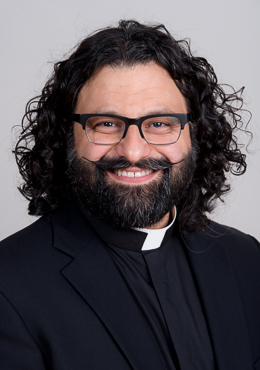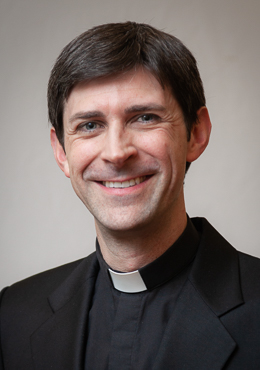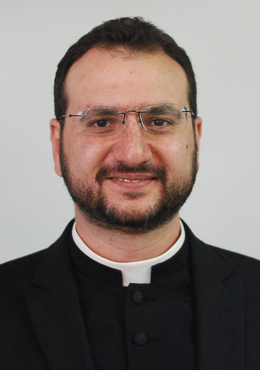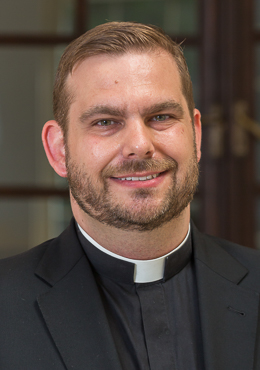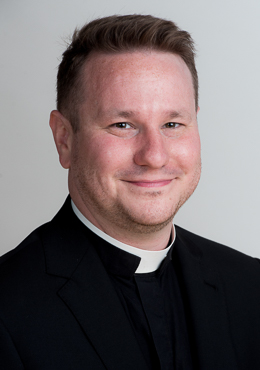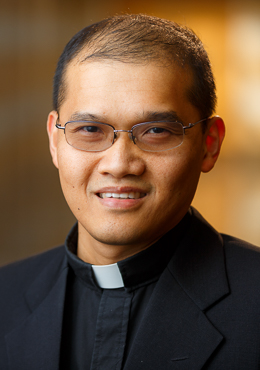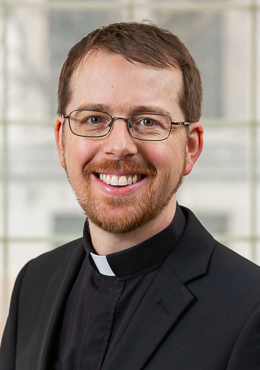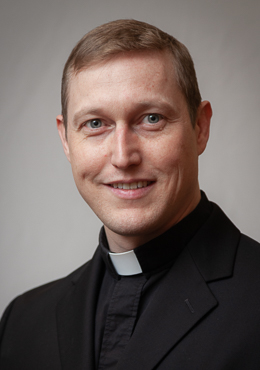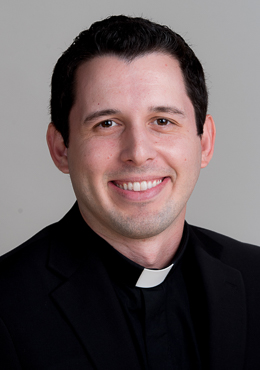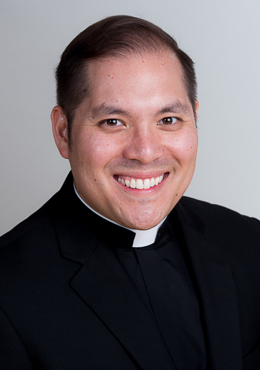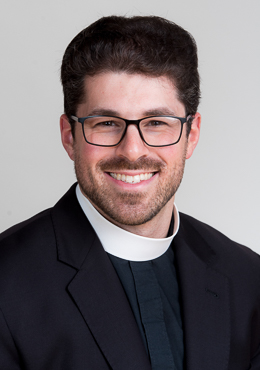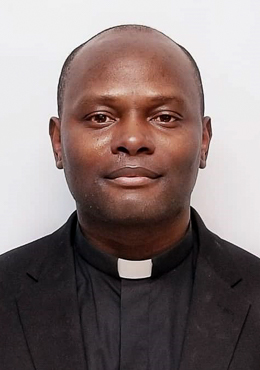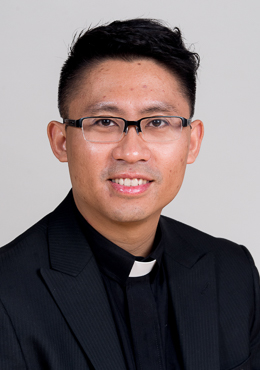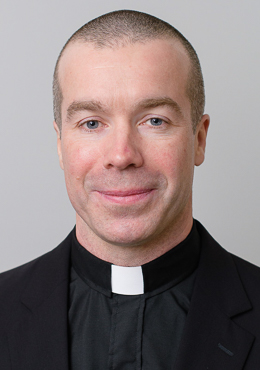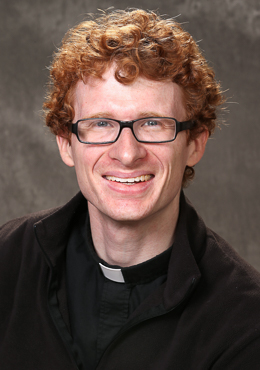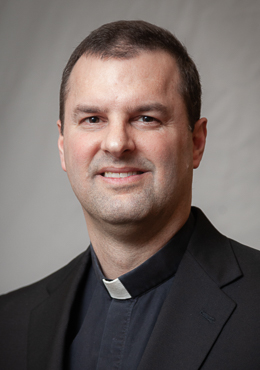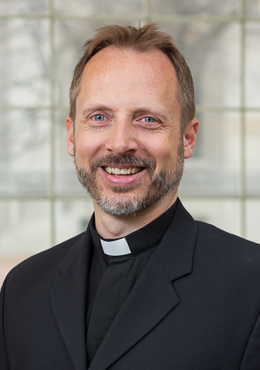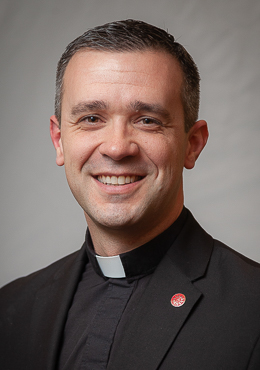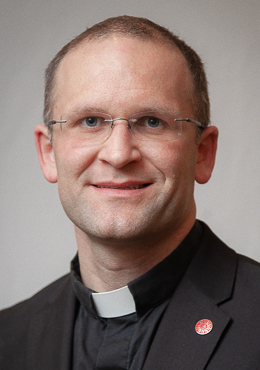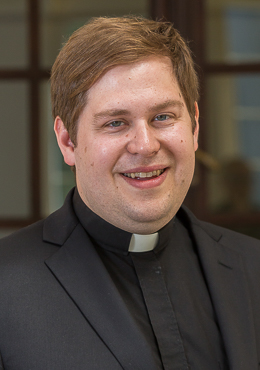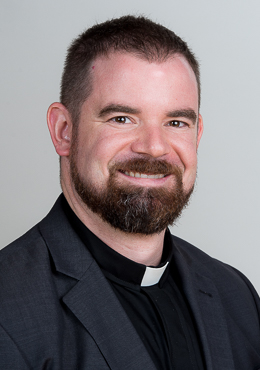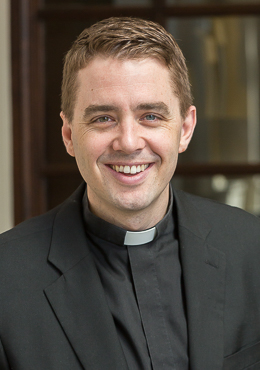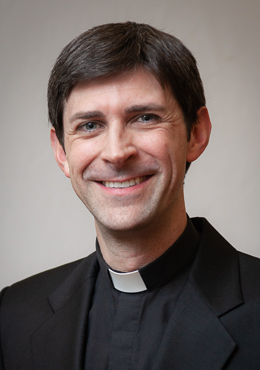
Province: USA Central and Southern
Birthday: June 22, 1979
Hometown: Casa, Arkansas (population: 202)
Education:
Bachelor’s degree, international development, Duke University
Juris Doctor, Yale University
Doctorate, international relations, Oxford University
Diploma in Philosophical Studies, University of Toronto
Master of Divinity, Boston College School of Theology and Ministry
Licentiate in Sacred Theology, Boston College School of Theology and Ministry
Highlights of Jesuit
Formation:
Served at a parish in the mountains of El Salvador
Taught political science and law at Spring Hill College
Ministered to inmates at a prison in Boston
Post-Ordination:
Will serve as associate pastor at St. Francis Xavier (College)
Church in St. Louis
Biography:
Matthew Baugh, SJ, was born in the small town of Casa, Arkansas
(population: 202), where he spent most of his childhood before his family moved
to Mendham, New Jersey, and finally to Raleigh, North Carolina. After
graduation from Ravenscroft School in Raleigh, he went on to study
international development at Duke University, where he was active in the
Catholic Student Center. During two extended stays in rural Haiti, Matthew
worked with an American Benedictine sister and local youth to produce 18 radio
broadcasts on matters of public health. For Matthew, this was a profound
experience of Christ’s presence in the poor, which sparked initial stirrings of
vocation to the religious life. Named a Rhodes Scholar in 2001, he went to
Oxford University for the following three years. There, he studied
international relations and first met the Jesuits, who were active in both the
intellectual and spiritual life of the university. While continuing the
discernment he had begun with one of the Jesuits at Oxford, Matthew came back
to the United States to complete a law degree at Yale University. In 2007 he
entered the Jesuit novitiate at Grand Coteau, pronouncing his vows in 2009
after experiments at the U.S.-Mexico border, at L’Arche Mobile, at Jesuit High
School New Orleans, and at a parish in the mountains of El Salvador. Before
going on to philosophy studies at the University of Toronto from 2010 to 2013,
he was sent back to Oxford for one year to complete the doctorate he had put on
hold to enter the Society. He was sent to Spring Hill College in Mobile,
Alabama, for regency from 2013 to 2016, serving as assistant professor of
political science and law and assisting with the spiritual formation of
students, staff and faculty. He also helped to reactivate the old college
sodality, originally founded in 1847 and now thriving once again. While
completing his theology studies at Boston College the past three years, Matthew
has ministered to inmates at Boston’s main prison and has served as deacon and
director of RCIA at Boston University Catholic Center. (USA Central and Southern Province)

Matthew (center) ministering at the L’Arche community in Mobile, Alabama.
What is one hobby you’ve cultivated as a Jesuit and why is it important
to you?
A few years ago, a married couple that I'm close to got me hooked on
crosswords. I had never solved a single crossword in my entire life to that
point. Now I find myself trying to shave time off my performance and reading
blog entries about puzzles. I've also seen the quirky documentary
"Wordplay," which I highly recommend! All evidence suggests that
crosswords are the intellectual equivalent of a viral epidemic — but they're
fun, so surely that balances things out.
Tell your vocation story. One catch: You must use only six words.
"Son, everything I have is yours." (Lk 15:31)
Who is one
important mentor who has accompanied you on your journey? What made them a good
mentor?
Nick King, SJ, the first Jesuit I ever knew, the one who helped me to discern
my vocation to the Society of Jesus, has remained a dear friend and model.
While I was a graduate student in Oxford where we met, he was chipping away,
verse by verse, at a translation of the New Testament meant to capture the raw
power of the original Greek. (He has since completed a translation of the
entire Bible.) But what struck me most was his astonishing preaching. Here was
a man, I thought, who has met Jesus Christ, who knows the Word intimately as a
person and not as mere words on a page into which we must ourselves breathe
life.
What is your
favorite book, movie, music, or TV show you’ve encountered since entering the
Society and why do you love it?
I will never forget the first time I heard Morten Lauridsen's
"O Magnum Mysterium," or Elgar's "Nimrod," or Haydn's two
cello concertos. Mozart almost single-handedly carried me through my
dissertation, reassuring me with his childlike joy when it seemed impossible to
take another step. When I would reach a point of confusion and the whole
project seemed like a hopelessly tangled mess, I would listen to the farewell
quintet from the “Magic Flute” or to “Laudate Dominum” — or really any piece
chosen almost at random — and it was as if the beautiful simplicity and clarity
of heaven would cut straight through the murkiness. Thornton Wilder has the
power to do something like this in the literary sphere with the love he shows
his characters and his uncanny attentiveness to the confessional disposition of
each one. What he finally has to say, especially in a book like "The
Bridge of San Luis Rey," is that love is the final meaning of all things,
even the life of such dubious characters as a harlequin and a self-absorbed
aristocrat. Surely there is room in that company for someone like me!

Matthew with his retreat group.
What do you
love about the Society of Jesus?
Nothing reveals the heart of the Society of Jesus better than the
meditation on the Nativity from the Spiritual Exercises — and especially the
way Ignatius proposes that we enter the prayer. Our attention is focused on
how, even here in the baby Jesus, God is laboring for us, happy to be born in
extreme poverty so that after even more "labors, after hunger, thirst,
heat, and cold, after insults and outrages, He might die on the cross, and all
this for me." (#116)
How in the world can I possibly approach this mystery? Ignatius says: "I will make myself a poor little unworthy slave, and as though present, look upon the [persons], contemplate them, and serve them in their needs with all possible homage and reverence." (#114)
Even as a small child, it was somehow clear to me that in Jesus a divine drama is unfolding, one that invites us in to play a part. I spent untold hours arranging and re-arranging the nativity scene in my childhood home lost in the world of that stable! The advent wreath, too, captured my imagination. An unusual wreath, it was wooden and had carved scenes from the Old Testament precursors of the Lord, and it sat in the middle of our kitchen table. Each night at dinner, we had what I can now recognize as a domestic liturgy in which we read something from Scripture that corresponded to a scene on the wreath. As more and more lights were added, it was if a great conflagration were about to break out over the whole face of the earth. That is my fundamental experience of the Lord and his word: that something ever greater is always about to happen. A new vista unveiled, instructions given, a word of reassurance spoken. There is a beauty that touches us in the deepest part of ourselves, and all we can do is receive it and let it bear fruit in us, usually in ways that we cannot quite measure or pinpoint. To give the Lord freedom to act in me this way, to speak to me what he wishes, to give me something with which I can in turn console others, this is what the Society makes possible in my life.
